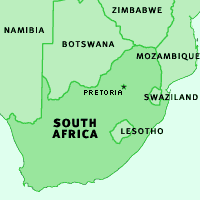Bush Trip to Africa, July 2003
|
Printer Friendly - PDF, 14 pages Single Page Web Version Trip Schedule Access one-page backgrounders on countries and crises Senegal and West Africa (Map) South Africa (Map) Botswana (Map) Uganda (plus Great Lakes and Sudan) (Map) Nigeria (Map) 
|
Stop Number Two: South Africa
Key question for the Bush team: how to bolster Mbeki's regional leadership while encouraging his engagement on human rights issues that the U.S. considers important.
South Africa is emerging as a strong continental leader. President Thabo Mbeki has been at the forefront of efforts to strengthen regional governance through the re-conceived African Union (AU) and the launch of the New Partnership for Africa's Development (NEPAD). In these efforts, Mbeki has supported greater accountability and transparency, including respect for human rights. The Bush team will want to engage Mbeki in public pressure on human rights conditions in Zimbabwe, and in statements on antiretroviral drugs for AIDS.
Under Mbeki's leadership, South Africa has played a growing role in continental peace efforts. In Burundi, South Africa has worked to establish the interim power-sharing government and to facilitate cease-fire agreements. Mbeki has played an important role in the peace process for the Democratic Republic of Congo, including hosting the Inter-Congolese dialogue, which led to the current power-sharing government. South Africa has also contributed troops to the multinational emergency intervention force in Bunia.
The Group of Eight major powers (G8) has agreed to mobilize technical and financial support for the creation of an African Standby Force for conflict prevention and rapid response to emergency situations. Beyond this, Bush should support South African and other regional initiatives to promote peace. He should voice his support for African Union programs such as the Peace and Security Council, which will be established at the AU Summit in July.
The HIV/AIDS epidemic is raging in South Africa, with millions already living with the disease. Unfortunately, the government is resisting providing basic care and treatment programs, including those to prevent mother-to-child HIV transmission (MTCT). President Mbeki, supported strongly by Health Minister Manto Tshabalala-Msimang, has publicly stated that he believes HIV does not cause AIDS and that antiretroviral drugs, which have transformed the lives of millions around the world, are unproven or "toxic." MTCT services, so crucial to save newborns from being born HIV-positive, were supported by the government only after a court case brought by AIDS activists mandated the action.
AIDS activists and COSATU, the country's biggest labor union, have helped create a strong nationwide movement in favor of treatment for people with AIDS, which will undoubtedly play an important role in next year's elections. Former president Nelson Mandela has urged the government to do more for people with AIDS. President Bush should encourage President Mbeki to do everything possible to advance AIDS prevention, treatment and care programs.
Zimbabwe has fallen into a political, humanitarian and human rights crisis that shows little promise of improvement. After the government's proposed new constitution was defeated in a referendum in February 2000, abuses by police and security forces increased sharply, especially against the opposition MDC (Movement for Democratic Change). White-owned commercial farms were invaded, sometimes by mobs that were sponsored by the state, and the government failed to take firm action against the lawlessness.
Since his controversial reelection in 2002, President Robert Mugabe has clamped down on freedom of the press and on civil rights, resulting in violent beatings by police officers, arbitrary arrests, and harassment of the political opposition, human rights activists and the media, among other abuses.
Zimbabwe's "fast-track" land reform policies have severely exacerbated drought-induced food shortages by crippling Zimbabwe's farm industry. Agricultural production was less than 30% of normal capacity this year. Further, the politicization of both government and international humanitarian food aid programs has left millions of Zimbabweans malnourished and hungry.
The Bush administration has strongly and publicly condemned the human rights abuses and lack of rule of law in Zimbabwe, and imposed a visa ban on Zimbabwe's leaders, freezing their assets abroad. President Bush should continue to speak out about these abuses, and should support the regional efforts by the African Union and the Southern African Development Community (SADC) to help solve the crisis. The U.S. should continue to support humanitarian assistance for Zimbabwe's population but should reverse the USAID decision not to provide food aid to resettled farmers based on USAID's objection to the "fast-track" land reform program.
More information from Human Rights Watch is available online:
Under a Shadow: Civil and Political Rights in Zimbabwe: A Human Rights Watch Report Briefing Paper (June 9, 2003)
http://hrw.org/backgrounder/africa/zimbabwe060603.htm
Press Release: http://hrw.org/press/2003/06/zimbabwe060903.htm
Fast Track Land Reform in Zimbabwe: A Human Rights Watch Report (March 2002)
http://www.hrw.org/reports/2002/zimbabwe/
Press Release: http://hrw.org/press/2002/03/zimbabwe0308.htm